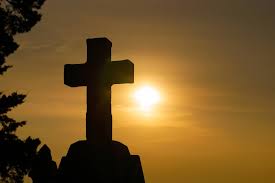For the week of April 7, 2025

I first wrote the piece from which this is adapted back in 2017 following a mass shooting in Portland, OR. I had been saddened by the report of another mass murder. These days, I have to limit the amount of news that I read or to which I listen because most of it makes me sad or angry. No one questions the horrific nature of a mass shooting … especially if it takes place in a school of small children, but what about all the lives that are being destroyed by the unbridled disregard for the least among us? Have we come to a point where we draw the line regarding what is horrific at gun violence? Do only the lives of those we know and love matter?
Studies have shown that persons who witness crimes or violence against individuals often “look the other way.” And, events like those in Portland in 2017 (and so many since) give credence to the argument that the safer choice may be to do just that. But is that OK?
The 10th chapter of Matthew is all about the cost of discipleship, and it’s not a passage for the faint of heart. Here’s an excerpt…
“See, I am sending you out like sheep into the midst of wolves; so be wise as serpents and innocent as doves. Beware of them, for they will hand you over to councils and flog you in their synagogues; and you will be dragged before governors and kings because of me, as a testimony to them and the Gentiles… have no fear of them; for nothing is covered up that will not be uncovered, and nothing secret that will not become known…Do not think that I have come to bring peace to the earth; I have not come to bring peace, but a sword…Those who find their life will lose it, and those who lose their life for my sake will find it.”
It’s way easier to say these things than it is to do them. And, I know, reading the Scripture in this way is dangerous and out of context, but you get the idea… “DISCIPLESHIP IS NOT EASY.” We don’t know if those who are daily affected by the wars, division, and strife in our world are Christian disciples or followers of another world religion. We don’t know if they are religious at all. What we do know is that they were created by God, and they deserve our love and support… not just our prayers. Thankfully, there are those who are willing to take action, knowing that it could cost them their livelihoods, if not their very lives.
Is there something we can do … some action we can take? Yes, but it raises a question that I fear many of us would prefer not to address, and that is: “Where do I (you) draw the line?” How far is too far when it comes to defending: your faith, the life of another innocent human being, the worth of all persons, the rights of those who are oppressed or abused, what is “right” (to love the Lord your God with all your heart, might, and mind…and to love your neighbor as yourself…not only in word, but also in deed)? What are you willing to risk losing…for the sake of the Gospel?
If our line is immovable or our willingness to risk losing something is non-existent…we may need to rethink our baptismal covenant, because…at a minimum…to take on the mantle of disciple is to automatically lose our right to ignore God’s call in our lives!
Blessings,
Blake
For the week of March 31st, 2025

“Be certain your feet are planted in the right place before you decide to stand firm.” – Abraham Lincoln (adapted)
“The greatest thing in this world is not so much where you stand, but rather in which direction you are going.”
– Oliver Wendell Holmes
My wife wrote these two quotes in the back of the Bible that she gave me when I was first ordained. At the time, I thought they were nice sayings, and good advice. I had no idea how relevant they would be for my journey of faith, and ultimately my journey of ministry in partnership with God. In those days, I relied on the fact that the foundation that had been laid for me was in fact a “firm foundation”… one that would surely stand the test of time. If God is unchanging then the things I had been taught and thought I knew with certainty would surely also stand the test of time.
At some point, however, life began to happen. Not only was I introduced to people, thoughts, and ideas that required examination of my strongly held worldview, I found myself experiencing God in new ways. The problem was that certain things in my worldview got in the way. My view of God in the midst of this new reality was obstructed by the framework I had built around me.
Let me explain using an example from my office space. I have the blessing of being able to work from home. A few years ago, we converted a bedroom into an office space for me. After examining the space and the furniture that we had, I determined a “best case scenario” for furniture arrangement in which my desk was place in the middle of the room facing the door. The remainder of the furniture filled the spaces beside and behind me. I had easy access to everything with a simple swivel of my chair. And… I had a clear view of the door and any passerby. My “worldview” was uninhibited … until I got a new computer with larger monitors. All of the sudden, I could see my work much better, but I felt like I was in a cave. I could no longer see past the monitors and out the door. It was time for a little feng shui, or in layman’s terms … furniture re-alignment. Now, my office chair is in the middle of the room, and with a quick swivel, I have an unobstructed 360° view.
As we come to the end of the Lenten season, perhaps it is a good time to consider some feng shui in our hearts and souls … in our relationships with God and with others. What obstacles get in the way of you having an unobstructed view of what God is doing around you, or maybe even what God is calling you to in your life so that you might have the abundant life Jesus promised. It may be as simple as a little movement of the “furniture” in your life. And yes, it may even take a re-aligning of the whole space in order to make room for the movement of the Spirit to get you going in the right direction. All I know is there is wisdom in the quotes above, and freedom in a little feng shui.
Blessings,
Blake
For the week of March 24th, 2025

This week is the third week of Lent, and it might surprise you to know that L-E-N-T is not the only lint I’m thinking about today. Actually, I’m sitting in my office writing this, while outside my office two men are cleaning the air duct system in my house. All I can think of is, I hope they don’t charge by the pound when carrying out the lint, dog hair, and assorted other dust particles that they remove from the ducts. One Golden Retriever creates an unbelievable amount of hair.
Anyone who knows me well, knows I like a good play on words, hence the focus on L-I-N-T. Although the season of Lent is often thought of as the time when we give something up or get rid of something that is in our lives, the true purpose of Lent is to make space for our relationship with God by turning away from the things in our lives (sins, obsessions, distractions, lower case “g” gods, etc.) which separate or create barriers between, us and God. It is a time for honest self-reflection in which we willingly let go of tangible and intangible things that keep us from being able to experience the fullness of God’s love for us, because sometime turning away isn’t enough. Sometimes they do need to be removed.
When I think about the things that might be barriers to my relationship with God, dryer lint seems to be an adequate analogy. The lint that gathers on the screen in my dryer is primarily made up of tiny fibers that have been released from my clothing as a result of the cleaning process. Each of the fibers is rather harmless on its own. They can even be so small that they might go completely unnoticed if left to themselves. The problem is that they accumulate over time, and that’s where the prospect for “trouble” comes into play. Gathered together, they form a shield that begins to collect other items (hair, dust, dirt, and other particulates), and before you know it, the dryer struggles to effectively do what it was created to do… dry clothes. Even dryers need to breathe freely.
Just like the fibers that gather on the lint screen in my dryer, so are the things in my life that keep me from fully experiencing the type of lifegiving relationship that God desires to have with me. They start small, and, by themselves, seem inconsequential. Were it not for the accumulation of those things over time, I might be able to continue on without noticing their effect. But they do accumulate, and they do, if I’m not careful, begin to stifle the ability of the Holy Spirit (the free flow of air) to give life to that relationship.
If you’re like me, it’s time to “clean the ‘lint’ screen.” So, here’s a scripture for you to use as a prayer for the remainder of your Lenten journey:
“Create in me a clean heart, O God, and put a new and right spirit within me. Do not cast me away from your presence, and do not take your holy spirit from me. Restore to me the joy of your salvation, and sustain in me a willing spirit” (Psalm 51:10-12: NRSV).
Blessings,
Blake
For the week of March 17th, 2025

The Pharisees, in an attempt to trick Jesus, said, “Tell us, then, what you think. Is it lawful to pay taxes to Caesar or not?” But Jesus, aware of their malice, said, “Why are you putting me to the test, you hypocrites? Show me the coin used for the tax.” And they brought him a denarius. Then he said to them, “Whose head is this and whose title?” They answered, “Caesar’s.” Then he said to them, “Give therefore to Caesar the things that are Caesar’s and to God the things that are God’s.”[i]
Years ago, while living in Ohio, I learned about a concept called Adverse Possession where one person can gain ownership of land that was not originally his/hers if they use and tend to the land for ten years without contest. I was having a conversation with my new neighbor, who had seemed hesitant to talk to me much less to become friends. Only over time, did the walls come down and the friendship grow. And only then did I find out the reasons why. My neighbor had known about adverse possession, and had been in a constant struggle with the previous owner of my house over boundary lines. Apparently, my predecessor had been the first in the neighborhood to put up a fence… which he had placed outside of his property line. My neighbor had insisted that the fence be moved, and my predecessor had argued that it was a lot of expense for “a couple of inches.” The thing is that it may have only been a couple of inches, but the fence line was over 100 feet long … meaning a total loss of over 200 sq ft of property. Because of my neighbor’s persistence, the fence had finally been moved to the proper location.
We are living in a world where our “property lines” are being threatened … and, by property lines, I mean our faith and values … and by our faith and values, I mean Community of Christ faith and values … pursuit of peace, worth of all persons, sacredness of creation, unity in diversity. Some in Christianity would have us believe that the threat comes from outside of Christianity. And, though that may hold some truth, it does not hold all truth, because there is just as much of a threat coming from within Christianity. Like some of the Pharisees in Jesus’ days, there are those who have a distorted view of what God desires, and who God loves, and more importantly to whom this world and all that is in it belongs.
There is an unspoken message in the passage of scripture (above) taken from the 22nd chapter of the Gospel of Matthew. In it Jesus says, “give to God what is God’s.” Hmmm. Doesn’t that then mean everything? We do, after all, believe that everything comes from God, and therefore belongs to God. Sure, Caesar ordered the coins to be made, but the materials from which the coins were made were not his … they were God’s.
When we cede our faith and beliefs with rationalizations like, “that doesn’t apply to me,” or “that’s not really a big deal,” or “that’s someone else’s problem, as long as I live my life in alignment with God’s laws, as long as I don’t hurt anyone, as long as…”
I am reminded of the poem, “First They Came,” by Pastor Martin Niemoller,
First they came for the Communists
And I did not speak out Because I was not a Communist
Then they came for the Socialists
And I did not speak out
Because I was not a Socialist
Then they came for the trade unionists
And I did not speak out
Because I was not a trade unionist
Then they came for the Jews
And I did not speak out
Because I was not a Jew
Then they came for me
And there was no one left
To speak out for me.[ii]
We, in Community of Christ, have a testimony of God’s unconditional love for all. Since our beginning, we have held a set of core beliefs that our world needs, but we have not always lived them in a way that is as inclusive as our written/recorded message. If we don’t stand up and live out what we say we believe, soon there will be no one left to speak out for the God we have come to know… A God of love and peace and welcome … a God of grace and mercy and second chances … a God who has called us to “be in the forefront of those organizations and movements which are recognizing the worth of persons and are committed to bringing the ministry of [Jesus Christ] to bear on their lives.”[iii]
Our “neighbors” are moving the fence constantly. It may only be a few inches at a time, but before we know it, they could “own” everything by means of adverse possession.
May we not only “speak and sing of Zion. [Let us] live, love, and share as Zion: those who strive to be visibly one in Christ, among whom there are no poor or oppressed.”[iv]
Blessings,
Blake
[i] Matthew 22:17-21 (NRSVUE)
[ii] Martin Niemoller, “First They Came,” https://hmd.org.uk/resource/first-they-came-by-pastor-martin-niemoller/
[iii] Doctrine and Covenants 151:9 (April 1974)
[iv] Doctrine and Covenants 165:6a (June 2016)
For the week of March 10th, 2025

As I watch what is going on in the world around us… especially all of the division, I think it is important for us to think carefully about how we interact with one another … with those with whom we agree as well as those with whom we disagree. That said, this post from June of 2019 seems relevant for today…
Creative. Comical. Dramatic. Diverse. Powerful. Rarely, in my experience, can these words be used together to describe a single play or musical … especially one put on by an amateur cast. But, I recently witnessed such a production at the local community college. The average age of the cast was probably about 14, with the lead, a college student, being the oldest. It was not only better than I expected…it was at least equal to the best musical I had ever seen…even on Broadway.
If you find yourself wondering what musical it was, you’ll just have to continue wondering. Because, although the content/storyline of the musical may have played some role in the enjoyability (and power) of the experience, the real power of the musical came from the giftedness of the individual cast members, the ways in which they interacted, and the unspoken message that “spoke” louder than words.
For a couple of hours, I witnessed what I ought to witness every time the church gathers, and what I wish I could witness everyday in every situation… a living out of diverse yet sacred community. Though the level of talent was not diverse (they were all truly amazing), the cast ranged in age and size and color. They laughed together, sang together, and danced together. They uplifted one another and encouraged one another. There were no prima donas or “show boaters.” There was no one left in the shadows. Even as the cast mingled among the audience in the lobby after the musical, their support of one another continued.
I have no idea if the message I “heard” was intended by the writers of the musical, or if it was just a coincidence brought about by the perfect storm of writing, casting, direction, acting, and talent. More importantly, I have no idea if the cast members realized the potential they wielded through their performance to make a statement that could be world changing. For that matter, I don’t know if they would have wanted to make such a statement. The thing is, they did it anyway. Consequently, I found myself running the gamut of emotions … laughing one moment, and crying the next. I did not want the musical to end.
As I think back about the musical, there are two take aways that have continued to come to mind:
First…intended or not, our “acting” (actions) has an impact on those around us. How we treat others. How we interact with one another. Whether we lift up or put down. Whether we are encouragers or discouragers. Whether we’re always trying to be soloists, or whether we sing in chorus sometimes so others can shine. Who knows, maybe we could make a world changing “statement” without even speaking a word.
Second…the pure joy that shone through the faces of the cast during and after the performance, if not due to the message that I heard, was surely at least in part due to the “family” they had created while doing the hard work of bringing the story to life. God promises us that we can experience that same pure joy when we are willing to create “family” while doing the hard work of bringing the Gospel story to life.
The writers of the musical may not have intended for me to experience their musical in the way I did, and the cast members may not have known the impact they were having on me as I watched. But it happened anyway!
No one else in the audience may have picked up on the message I “heard.” But I heard it anyway (and I’m guessing I wasn’t alone).
What impact does your daily “performance” have on others? Who in your life needs to “hear” God’s message through your actions?
Blessings,
Blake
For the week of Mar 3rd, 2025

This is adapted from a “From the Desk of…” that originally posted in February 2018.
I know, I know…some of you are looking at the title and saying, “That’s not even a word.” If you’re in that crowd, work with me (if you have no idea what I’m talking about, never mind). I mean, if words like lisitcal, Suessian, and pareidolia can make it into Webster’s… why can’t revelant?
Revelant (adj.) – making interesting or significant information known, especially about a person’s attitude or character.
Actually, this is the worldwide web dictionary definition for revealing, but that didn’t sound quite as catchy, and you know how I like play on words!
So, back to the question…relevant or revelant or both? Over the past several years, I have been involved in conversations where someone has said, “church is no longer relevant”… “or Christianity is not for me…I’ve seen what it can do to people.” Let me say that I have never heard anyone say that the core message of Christianity (as taught and modeled by Jesus) is no longer relevant. The irrelevance in their eyes has more to do with how it’s lived out by “Christians” Sunday after Sunday in our churches and how it’s often NOT lived out on the days in between.
Everything we do or say…whether it be on Sunday morning or any day in between…whether it be church-related, work-related, family-related, or otherwise related…reveals something about the true nature of our character, the character of the church, and the real importance of those things we say we hold most sacred. (Worth of All Persons, Sacredness of Creation, Unity in Diversity, Blessings of Community just to name a few). Our words and actions are always “revelant!” By our action or our inaction…by our vocalization or our silence…we are always revealing something, regardless of its relevance to the gospel message of love, acceptance, grace, mercy, forgiveness, inclusion, mutual respect… Again, just to name a few!
What is relevant is always revelant (revealing), but what is revelant is not always relevant.
God is never changing, but is always relevant. We must, as the Body of Christ, become relevant in the world if we are to have hope of building the Kingdom of God as we have been called. And, the call is clear…
“God is calling for a prophetic community to emerge, drawn from the nations of the world, that is characterized by uncommon devotion to the compassion and peace of God revealed in Jesus Christ. Through divine grace and wisdom, this faith community has been given abundant gifts, resources, and opportunities to equip it to become such a people. Chief among these is the power of community in Christ expressed locally in distinctive fashions while upholding a unity of vision, foundational beliefs, and mission throughout the world.” (Doctrine and Covenants 163:11a)
“Community of Christ,” your name, given as a divine blessing, is your identity and calling. If you will discern and embrace its full meaning, you will not only discover your future, you will become a blessing to the whole creation. Do not be afraid to go where it beckons you to go. (Doctrine and Covenants 163:1)
In other words, listen to God…watch and see what God is already doing in the world…join God in that pursuit and you will find that the message (and by association, the church) can be relevant and revelant, just as God intended from the beginning.
One thing is for sure, if we don’t re-connect with the always relevant hope of the Gospel…living it out in tangible, missional ways that speak to a world in need… and heaven knows our communities, our country, and our world are in need … what we reveal will no longer matter, because God will find someone else to do it. Or, even worse, the world in need will look elsewhere.
Blessings,
Blake
For the week of Feb 24th, 2025

In the rush and hurry of getting important work tasks checked off the “To Do” list so that I could go on a much needed family trip, I forgot something very important… the plant in my office. I walk by it “a million” times every day. As a matter of fact, because my office is small and the plant is big, I have to be careful not to knock leaves off of it when I pass. It is an unavoidable presence in my day. And yet, in the midst of hurry, it sat unattended.
It’s not that it takes a lot of care. It only requires water once a week. Otherwise, it lives off what sunlight it can get from the window by which it sits. Quietly, it awaits it weekly watering, all the while providing a more pleasant atmosphere in which to work. In many ways, it is a symbol of life and balance, patience and determination. It does not criticize, judge or complain. Somehow it seems to know that I will eventually acknowledge it’s presence and provide the nourishment that it needs to thrive.
Upon my return home from our trip, I jumped right back into work. There was much to be done. Meanwhile, the plant, unattended now for over two weeks, waited…patiently. Signs of neglect, drooping stems and browning leaves, beginning to show. I’m embarrassed to say that I noticed the signs, and even made note that I needed to water the plant … as soon as I got a minute. But the day passed, and “the minute” never presented itself.
How often does our relationship with God go unattended … waiting for us to get a minute? How often do we ignore the signs of neglect (inability to focus on what matters, impatience with ourselves … with others … with God), yet fail to stop and “feed” that relationship, basking in its beauty, appreciating how little it takes to keep it alive and how great its reward when we do?
Jesus said that he came so that “[we] may have life and have it abundantly.” (John 10:10 NRSVUE, adapted). He came to show us God. He, himself, was God among us. And, in his time he showed us what it was like to be in relationship with God, and what were the benefits of giving attention to that relationship.
We’re lucky that God is patient with us. We’re blessed that we are God’s children’ and that God loves us enough to wait. Eventually, if left unattended, the plant would die, but God’s love for us never will. I watered the plant this morning, and already I am seeing signs of renewed life.
Do your part in watering, feeding, and nurturing your relationship with God. Don’t leave it unattended. A little bit of love goes a long way!! Imagine how much regular attention could produce.
Blessings,
Blake
For the week of Feb 10, 2025

For days, forecasters have been threatening that the Midwest would be confronted with a major winter storm… perhaps two. Forecasts included a first round storm that could produce several hours of one inch per hour snow falls, with total snow falls ranging anywhere between 5-7 inches in the first 24 hours. In preparation for the snow “event” I went to extra trouble to prepare. I scheduled my necessary trips for the first two days of the week, planned menus in advance, filled the cars with gas, cleared out the garage to make room for my car (my wife’s side is always clear), pre-salted the driveway and walkways, and made sure the snow blower was ready to go. I have never been so prepared. My Boy Scout leader would have been proud.
Occasionally, during the first 12 hours, I would glance out the window and see the snow coming down, but from my vantage point, I could not see how much was actually accumulating. Suffice it to say that when I finally took a break, during what was supposed to be the time of heaviest snow fall, and went down to clear the driveway, there was so little snow that I questioned whether or not a shovel was necessary… much less a snowblower. Granted, the day was not yet over, much less the week. But, by the look of things, “snow event” was going to be a gross over-exaggeration. Usually, I take forecasts with a grain of salt, since it seems that they are wrong more often than not, but this time I had put in a lot of prep work.
Thinking about my preparation, I couldn’t help but be reminded of the scriptures in the Gospel According to Matthew that talk about being ready (Matt 24:38-44; 25:1-13). The reality is that we never know for sure. Forecasts are really just a best guess… albeit an educated one. The same can be said about much of our faith journey. What will happen in the future (miracles, the Second Coming of Christ, the establishment of God’s peaceable kingdom on earth, or the end of the world) is unknown. The best we can do is guess … and many have!
Someone said about the weather forecasts this week, “I’ll believe it when I see it.” When it comes to God, we can’t wait until we “see it.” God is always working in the world around us, and often in small, quiet ways rather than through major events. If we wait to believe until we see it (God), we will likely miss the God moments that happen in the unexpected everyday encounters with others and with creation. We must not be lulled into complacency by false forecasts or claims, rather, we must remain diligent in our prep work of connecting with God. We know God is working. We want to be ready when the “snow event” (big or small) happens. But, we don’t want to get “snowed,” or snowed in.
Blessings,
Blake
For the week of Feb 3, 2025

“You shall also love the stranger, for you were strangers in the land of Egypt. “ Deut 10:19
I remember the first day of 6th grade like it was yesterday. It was the first time I had had to take a bus to school. It was the first time I would be in a school with a multi-racial student population. Of course, everything was bigger, and I felt like I didn’t know anyone. Even though I had “friends,” I was not really a part of any group or clique. For the first time in my life, I was a stranger in a “foreign land,” and, truth be told, I was terrified. I experienced emotions and feelings that I had never had to face.
Recently, I had an experience that reminded me of the first day of 6thgrade. I had decided to attend a special interest club meeting. I’m grown now, of course, and no longer experience fear in new crowds. However, like most, I do hate the feeling of being a stranger in a foreign land. Apparently, most newcomers to the club came with a current member (note to self) … not alone. I didn’t know anyone in the club, so I had no choice.
I arrived at the building and could see through the windows that people were mingling inside. I just didn’t know how to get to them. After figuring out how to get inside, I stood in the expansive meeting room wondering what to do next … hoping that someone would notice the new guy and give me directions. A welcome did not come, nor did directions. You see, everyone else was familiar with where to go and what to do. They were so caught up in “catching up” with one another, that I might as well have been invisible. A less determined person would probably have left. Fortunately, after about 25 minutes, someone finally noticed me and asked if I was new. He proceeded to hand me a membership form and a pen, told me to fill it out and come back, then moved on to others. At least he had spoken to me.
When it came time for a break during the meeting, I headed back to talk to the only person who had spoken to me since my arrival a little over an hour before. He was now sitting alone. We struck up a conversation, and he asked if I had met anyone. He seemed shocked when I said “no,” and proceeded to take me around and introduce me. It turns out that the group was pretty friendly, and the things they offered as a club were very relevant and helpful.
My guess is that my experience at this club meeting was not unique to me, nor is it unique to this club. The Israelites in the passage from Deuteronomy (above) needed to be reminded of their own life experience of having been strangers in the land of Egypt, and God’s command to love the stranger. I know that Community of Christ as a denomination has experienced similar times of being the stranger, the outcast, the persecuted. I expect that many, if not all, of us have also been in a similar place in life… “strangers” in a foreign land. No one wants to be alone.
It’s my prayer that you will consider, pray for, and if able, be with those in your life who are “strangers in a foreign land” … those who feel alone, or have been cast aside, because of a life choice or because of who they were created to be.
God’s command to love the stranger does not come with a list of qualifiers or conditions.
Love the stranger! Someday “the stranger” might be you!
Blessings,
Blake
For the week of Jan 27th, 2025

In the 4th chapter of the Gospel of Luke, verses 16 through 21 (you’ll have to look it up), we are reminded of that which was deemed most important by Jesus. As such, it is also a call to all who call themselves by his name. Personally, as a full-time ordained minister, charged with the care of God’s people (which I believe to be all people), I hear it as a mandate for mercy and love… a mandate that requires unity rather than division.
The following is an excerpt from the sermon offered by Bishop Marianne Budde at the inaugural prayer service in Washington, DC…a sermon that was not well-received by some, but a sermon (and plea) that is deeply grounded in scripture, and upholding the need to uphold the dignity of all people, to speak the truth in love, and to walk humbly with each other and with God.
Budde says…
“Unity is a way of being with one another that encompasses and respects our differences; that teaches us to hold multiple perspectives and life experiences as valid and worthy of respect; that enables us … to genuinely care for one another even when we disagree.
For unity, at times, is sacrificial, in the way that love is sacrificial. A giving of ourselves for the sake of another.
In his sermon on the mount, Jesus exhorts us to love not only our neighbors, but to love our enemies, and to pray for those who persecute us, to be merciful as our God is merciful, to forgive others as God forgives us. And Jesus went out of his way to welcome those whom his society deemed as outcasts.
I grant you that unity in this broad expansive sense is aspirational, and it’s a lot to pray for … worthy of the best of who we are and who we can be. But there isn’t much to be gained by our prayers, if we act in ways that further deepen the divisions among us. Our scriptures are quite clear about this … that God is never impressed by prayers when actions are not informed by them, nor does God spare us from the consequences of our deeds which always, in the end, matter more than the words we pray.”
These were probably not the words that brought about the angry responses. Rather, it was her plea for mercy in her closing remarks. But, like her, I wonder what good are our prayers for unity and our efforts to build the God’s kingdom on earth as it is in heaven if we can’t remind one another to exercise mercy in our decision making and in our actions? Honestly?
I’ll leave you with a blessing from A Black Rock Prayer Book:[i]
The world now is too dangerous
and too beautiful for anything but love.
May your eyes be so blessed you see God in everyone.
Your ears, so you hear the cry of the poor.
May your hands be so blessed that everything you touch is a sacrament.
Your lips, so you speak nothing but the truth with love.
May your feet be so blessed you run to those who need you.
And may your heart be so opened, so set on fire,
that your love, your love, changes everything.
Have mercy,
Blake
[i] A Black Rock Prayer Book An offering from Religious AF Camp, religiousafcamp.com
For the week of Jan 20th, 2025

Those of us who live in areas of the country or world where snow is inevitable at some point during the year may have any number of responses to the snow. There are those who love it and look forward to it. There are those who tolerate it, either because they’ve decided it’s just part of life, or because moving is simply not an option. And, of course, there are those who hate it. I’ll admit that I have been in all of those categories at one point or another in my life. Before moving north, snow was a novelty … something to be enjoyed for short periods of time and then left behind. I thought it would be so cool to be somewhere where there was a possibility of several feet of snow. After living in the Midwest for 30 years, the novelty has warn off. I still love skiing, though I haven’t done it in a long time. And, I love taking walks in the snow with my wife on mild evenings when a light, fluffy snow is falling. If only the roads didn’t get snow packed or slushy. If only snow didn’t stick to driveways and require shoveling.
Yesterday, I was reminded of how easy it is to lose our sense of awe when things become commonplace. The weather forecast said that my home town of Pensacola, FL , would likely get between 3 to 5 inches of snow. (One report said the record prior to 2025 was 3” set in 1895). No one believed it… until it started falling. They ended up with 7.9 inches … in NW Florida! I started getting pictures and videos of friends and family playing in the snow … dogs chasing snowflakes, 50+ year olds (yes, not just children) making snow angels, and snowmen of all shapes and sizes. For many, it would be a once-in-a-lifetime opportunity. The joy was contagious. I found myself wanting to be down there playing in the snow with them. They made snow look fun again!!
Today, snow began to fall outside my window, and there was no excitement. I didn’t feel the urge to go outside and make a snow angel, or build a snowman, or head off to a nearby hill with a sled in hand. I didn’t take pictures or send videos of my dog romping in the snow to friends. Was it because I have lost my childlike sense of awe? Was it because I knew that, unlike the snow in Florida, this snow would mean extra work? Or, was it because, for several months out of the year, snow has become commonplace… expected?
I find that it’s a bit like people who have just realized that they are lovable … that there is a God (and perhaps even a community) that will love them unconditionally. They may not take pictures or send videos, but they can’t wait to tell others what they’ve found. However, those of us who have grown up in a loving family, or had a support community that love and encourage us, or have experienced the unconditional love of God our whole lives are more likely to take it for granted and keep it to ourselves because it’s part of life … it’s inevitable … it’s expected … it’s commonplace. We assume that everyone has what we have.
A friend recently shared a Martin Luther King, Jr. quote with me and a few others that said, “I have the audacity to believe that peoples everywhere can have three meals a day for their bodies, education and culture for their minds, and dignity, equality and freedom for their spirits.”
Let’s not be ones who have the audacity to believe that peoples everywhere have experienced love and acceptance the ways that we have. Let’s not let God’s love for us become so commonplace that we sit silently by assuming that others have what we have.
Blessings,
Blake
For the week of Jan 13th, 2025

Today, I found myself on another of my treks across a more rural part of Illinois on my way to visit one of the congregations I serve. Over the last week, we have had a couple of snowy days with some parts getting heavier snowfall than others. The areas through which I travelled fell somewhere in the middle. Remains of corn stalks visible across the vast fields of white. As is often the case with fields after the harvest, there were several places where the tractor tire tracks were left behind. In those places, because the corn stalks had been pressed down, and the ground had been slightly displaced, the imprints, though covered with snow, were left for all to see.
I was reminded of a vacation my family and I had taken to Washington state. We were making our from Seattle to the eastern part of the state where we were going to visit family. The trip required passage through a mountain range, so we had planned time to make a stop or two at Mount Rainier on our way through. One of the stops we made was at a trail head, and we decided to take a hike. I was younger then, and, as younger children likely to do, I wandered off-trail to look at something of interest. Immediately, out of nowhere, (perhaps from a burning bush, because his words were heated), a park ranger sternly asked me to return to the trail and to be careful. He proceeded to tell me that it would take nature up to 200 years to repair the damage I had done to the “plants” on which I had stepped. I had no idea, and I was horrified. I don’t even know if it’s true, but I have never forgotten that.
When I saw the tractor imprints in the fields, I was once again reminded of the Mount Rainier experience, but not because of the “damage” that may have been done to the ground of the field. My reflections were the result of the visible presence of the imprints in the field combined with the knowledge of the possible impact that imprints can make … on the land, and on us.
Those of us who strive to create and live in community (sacred or otherwise) make an imprint on one another’s lives. And, intentionally or unintentionally, those imprints linger … even if not evident to the naked eye. We’ve been told, and we know from our own experiences, that words and/or actions have the power to wound or to heal. How much power they have depends on the “depth” of the imprint that is left behind. If the effects of our words and actions were healing, and lasted for 200 years, it would be great. But, what about those that wound. Could it actually take up to 200 years to repair the damage done … effecting generation after generation?
History shows that it could take even longer. Our task, then, is to make sure that our words and actions, and the imprints they leave behind, will be healing, reconciling, encouraging, and kind. If we don’t, who knows where the world will be in 200 years.
Blessings,
Blake
For the week of Jan 6th, 2025

There are several passages in the Bible that encourage us to pray. We are encouraged to pray … without ceasing (1 Thess 5:16-17) … with thanksgiving (Phil. 4:6) … in secret (Matt 6:6) … asking for whatever we need, in Christ’s name (John 14:13-14) … with the help of the Spirit (Rom 8:26). I wonder, though, how many times we pay particular attention to the “whatever you (aka “I”) need” passages.
I have no doubt that all of us pray for others. It must be the case, because I often hear folks say, “I’m praying for you,” or “sending thoughts and prayers your way in your time of need.” I know, from personal experience, the power of prayer, not because I always get what I ask for, but because I always feel better when I intentionally enter into God’s presence in pray by way of the Holy Spirit. It may not change the situation, but it changed something inside of me.
Recently, while driving to an appointment and listening to a Christian radio station, I heard the announcer offer a prayer challenge that got me thinking. She asked, “if all your prayers were answered, would it change the world, or would it just change yours?” I’d like to say that my immediate response was that it would change the world, but knew I needed to think about that a little bit. Answering one way or the other might make me feel good about my prayer life, but ultimately, this wasn’t about making me feel better. It was about making me be a better disciple.
In the days since hearing that challenge, I have spent some time considering whether or not my prayers fit with what I believe to be the key directives regarding prayer … that God’s kingdom would come in all its fullness, that God’s will would be done (Matt 6:10), and that my asking was done in Christ’s name. Knowing how biased my own will can be on things, I long ago gave over to intentionally praying for God’s will to be done, and most of the time meaning it … all of the time if you take into account those instances when I was absolutely sure that my will was aligned with God’s. Admit it, we’ve all been there … even when we weren’t!
The toughest directive, however, is the “in Christ’s name” part. Most of us end our prayers with some form or expression that means “in Christ’s name,” even when the content of our prayers might not be in alignment. In that regard, I think the prayer challenge asks a question we ought all to consider… if all our prayers were to be answered … as submitted … would it change the (whole) world, or just our own. Remember, if the whole world is changed, so will ours be!
Blessings,
Blake
